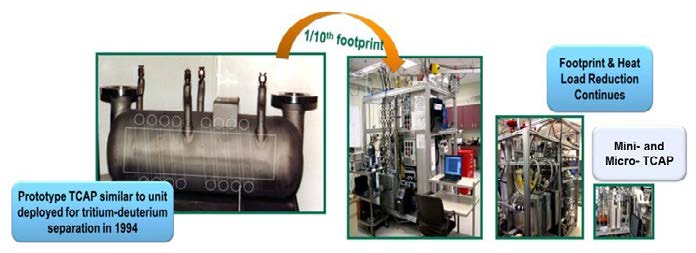Tech Briefs
Savannah River National Laboratory
Latest Thermal Cycling Absorption Process
Researchers at SRNL have advanced a method called TCAP (Thermal Cycling Absorption Process) to separate hydrogen isotopes (hydrogen, deuterium, and tritium) using a continuous method based on palladium gas chromatography.
Background
SRNL invented the TCAP for hydrogen isotope separation in 1980 to support its national security mission and has continued to optimize the process. SRNL’s TCAP is the world’s most advanced hydrogen isotope separation process because it utilizes palladium hydride technology in a continuous production mode. Since its deployment, SRNL’s TCAP has avoided hundreds of millions of dollars in tritium separation costs.
The advanced technology is the result of decades of research and development, continuous improvement, and tritium operation experience.
At a glance
- High purity tritium production for national security, research, and commercial use
- Inherent safety by design
- Robust process
- Reduced equipment footprint
- Increased throughput
- Reduced energy consumption
- Significantly reduced tritium releases
- Reduced tritium inventory and holdup
- Millions of dollars in cost avoidance compared to other technologies
- Patented intellectual property
Innovative Solutions
SRNL has created an advanced TCAP that significantly reduces the footprint of the system by using a different heat transfer design and adding a new column-separation material. It also reduces energy consumption, increases throughput, and reduces tritium levels in the byproduct gas stream so that tritium release to the environment is reduced.
The advanced TCAP design is a scalable process that can be leveraged to meet the needs of the fusion community and commercial partners, leading to potential mission growth and the opportunity for commercial enterprise. The project also produces patentable intellectual property.

Intellectual Property
This technology and methods for its use have been granted U.S. Patent No. 10,436,516 B2 (October 8, 2019), “Thermal Cycling Device” and is available for licensing.
Partnering Opportunities
SRNL invites interested companies with proven capabilities in this area of expertise to develop commercial applications for this process under a cooperative research and development agreement (CRADA) or licensing agreement. Interested companies will be requested to submit a business plan setting forth company qualifications, strategies, activities, and milestones for commercializing this invention. Qualifications should include past experience at bringing similar products to market, reasonable schedule for product launch, sufficient manufacturing capacity, established distribution networks, and evidence of sufficient financial resources for product development and launch.
Download Tech Brief
Contact Information
Savannah River National Laboratory
E-mail: partnerships@srnl.doe.gov